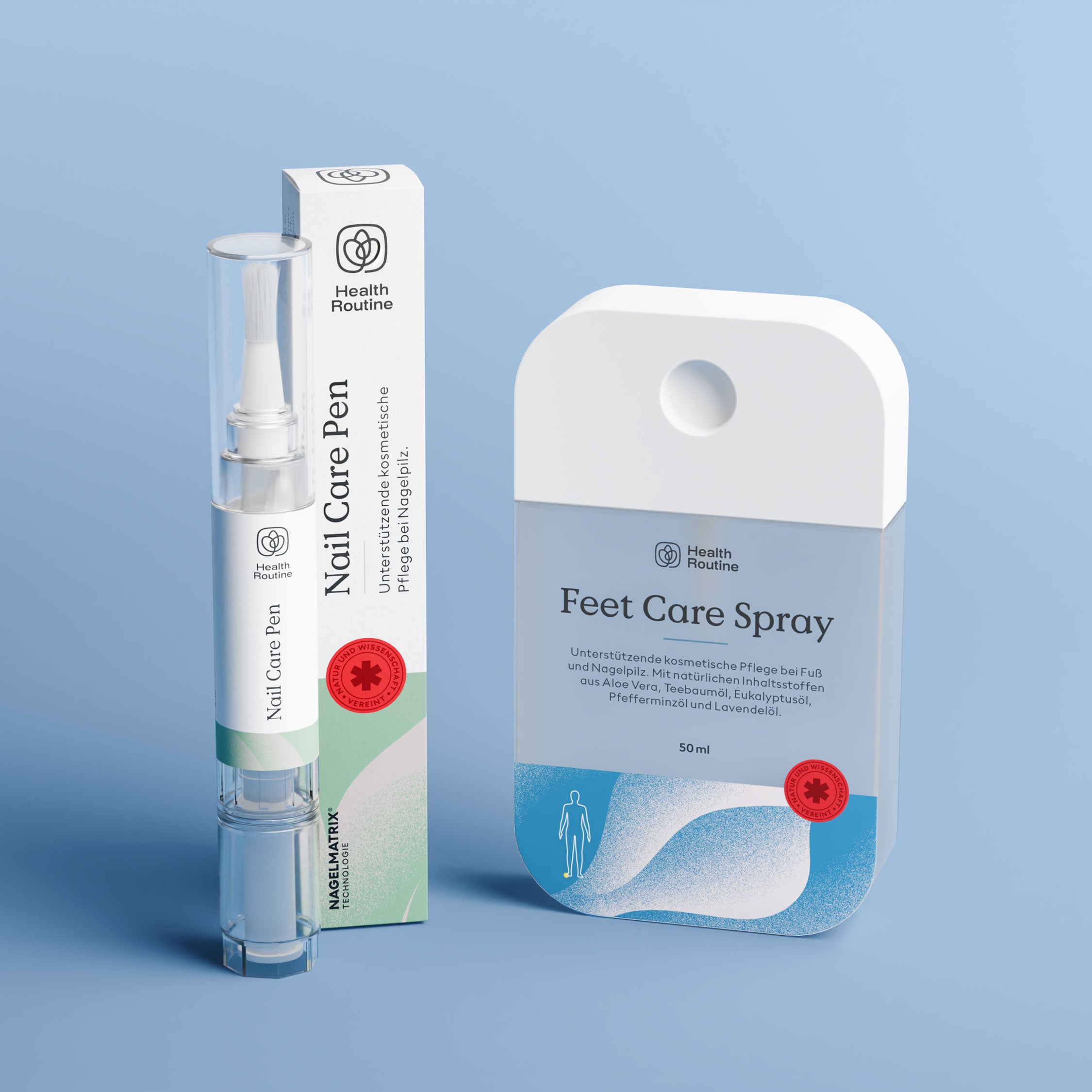Do you sometimes look at your hands and notice that your fingernails aren't completely smooth? Ridges in the fingernails are a common phenomenon and can have various causes.
In this guide, you'll learn all about the different types of nail ridges and what they might be.
We'll take you on a journey of discovery and show you what grooved fingernails or toenails can reveal about you.
Learn how to best care for your nails and what you can do to keep your nails strong and healthy.
The meaning of grooves in your fingernails
Ridges in your fingernails can be a source of curiosity: What do they actually mean? They're often harmless , but sometimes they can also be a sign of health problems .
Longitudinal ridges on the fingernails are particularly common and are usually a sign of the natural aging process .
But did you know that they can also indicate certain deficiencies or health conditions?
In this section, you will learn what longitudinal grooves in your fingernails could mean and what you can do about them.
Longitudinal grooves simply explained: Everything you should know
Longitudinal ridges in your fingernails are more than just a cosmetic problem. They can be a sign of changes in your body , such as a thyroid disorder.
Longitudinal ridges in the fingernails also often appear as we age, but they can also indicate a deficiency in important nutrients .
It is important to pay attention to your body's signals.
Expert tip: If you notice longitudinal ridges in your fingernails, you may want to consider changing your diet or skincare routine.
If you are concerned about a sudden change or the appearance of longitudinal grooves, you can consult a doctor for advice to be on the safe side.
Cross grooves simply explained: Everything you should know
Cross-grooves in the fingernails can be a mystery. They appear across the nail and can have various causes .
Sometimes they are a sign of a temporary disturbance in nail growth caused by stress or, for example, an illness .
However, transverse grooves in the fingernail, as well as longitudinal grooves, can indicate a thyroid disorder .
Brittle and splitting nails explained simply: Everything you should know
Brittle and splitting nails are not just an aesthetic issue, but can also be important signals from your body. If you notice particularly brittle fingernails with longitudinal grooves , this could indicate a deficiency in essential nutrients .
Cracked fingernails with longitudinal grooves can also be an indicator of a thyroid disorder or other imbalances in the body .
It is crucial to take the signals from your nails seriously and seek professional advice if necessary.

All causes of ridges in the fingernails at a glance
Grooves in fingernails can have a variety of causes . Some are harmless and part of the natural aging process, while others may indicate specific health conditions .
Here are some of the most common causes of ridges in fingernails to help you better understand the signals your nails are sending:
-
Aging process: As we age, longitudinal ridges in the fingernails are a common phenomenon. These ridges are usually harmless and a natural part of aging. They often appear as fine, longitudinal lines on the nails.
-
Vitamin and nutrient deficiencies: A deficiency in certain vitamins and nutrients can manifest as ridges on the fingernails. Iron deficiency, for example, can lead to wavy fingernails, while a deficiency in B vitamins can cause dents in the fingernails .
-
Thyroid disorders: Thyroid problems, such as hyperthyroidism, an overactive thyroid, can cause nail changes . Longitudinal grooves in the fingernails can therefore also be an indication of a thyroid disorder.
-
Stress and trauma: Acute or chronic stress, as well as physical trauma, can cause transverse ridges in the fingernails. These ridges, also known as Beau's lines, develop when nail growth is temporarily disrupted.
-
Inadequate nail care: Improper nail care or excessive use of nail polish and nail polish remover can weaken nails and lead to the formation of ridges. It's important to care for your nails properly and avoid harsh chemicals.
-
Skin diseases: Certain skin diseases, such as psoriasis, can also cause ridges in the fingernails. These often appear as pinpoint dents or deep, transverse grooves.
-
Harsh cleaning agents and chemicals: Regular contact with harsh cleaning agents and chemicals can damage nails and the nail bed, leading to ridges and brittleness. Wearing gloves when handling such substances can help protect nails.
-
Genetic predisposition: In some cases, ridges in the fingernails can also be genetic. If family members have similar nail structures, this could indicate that the ridges have a hereditary component.
-
Chronic diseases: Certain chronic diseases such as rheumatism or diabetes can also cause changes in the fingernails, including the formation of grooves.
These conditions can affect blood circulation and nutrient supply to the nails, which can lead to visible changes.
These causes provide a first clue to understanding the health of your nails . If you notice persistent or worrying changes in your fingernails or toenails, it's advisable to consult a specialist.

Are grooved fingernails a sign of nail psoriasis?
Grooved fingernails can sometimes be a sign of nail psoriasis , a condition associated with the skin disease psoriasis. In nail psoriasis, changes such as
- thickening of the nails,
- Discoloration of the nails
- Or the formation of dimples.
However, grooves in the fingernails alone are not a clear sign of this disease. Other symptoms such as skin changes or joint pain can also indicate nail psoriasis .
If nail psoriasis is suspected, it is important to consult a dermatologist for an accurate diagnosis and appropriate treatment.
What are Beau-Reil furrows?
Beau-Reil's ridges are prominent transverse grooves that run across the nail. They occur when the growth of the nail is temporarily disturbed , for example by
- Serious illnesses,
- Injuries
- Or periods of severe stress.
Expert tip: These grooves move outward as the nail grows and can be a useful indicator of past health problems or stress. Beau's lines are usually harmless and disappear once the nail has fully grown back.
Treatment options for ridges in the fingernails
The treatment of ridges in the fingernails depends on the underlying cause . Simple measures such as improved nail care or dietary adjustments often help. For longitudinal ridges, a special treatment with moisturizing or nourishing products can be helpful.
Discover the care with our Nail Growth Serum!
The Nail Growth Serum from Health Routine is a natural solution for your nail care. This serum combines valuable ingredients such as
- Almond oil,
- Jojoba oil,
- Coconut oil,
- Olive oil,
- citrus oil,
- Vitamin E
- and biotin.
These components work together to strengthen brittle and thin nails, make nails grow faster and restore their natural shine .
🌿 Citrus oil opens the nail at the cellular level so that the nourishing ingredients can penetrate deeply.
🌿 Almond oil protects against UV radiation and moisturizes.
🌿 Jojoba oil strengthens nails and nourishes cuticles.
🌿 Vitamin E and biotin can support nail growth and improve nail structure.
🌿 Olive oil and coconut oil offer antioxidant and moisturizing properties.
Try Health Routine's Nail Growth Serum and see how your nails grow faster, become stronger, and regain their natural shine.
Dermatological treatment for nail changes
If you notice noticeable changes in your nails, such as severe ridges, discoloration, or psoriasis , it's advisable to consult a dermatologist. A dermatologist can diagnose the cause of the nail changes and recommend appropriate treatment.
Sometimes nail changes can indicate more serious health problems, such as
- infections,
- Skin diseases
- Or deficiencies.
Early diagnosis and treatment can help maintain nail health and treat any underlying conditions.
Additional advice for ridges in the fingernails
Ridges in the fingernails can be a cosmetic nuisance, but there are simple ways to treat and prevent them.
Here are some tips:
-
Filing nails: Filing your nails regularly and correctly can help smooth ridges and reduce the risk of cracks.
Use a fine nail file and file in one direction to protect the nail structure.
For nail care, for example, the glass file from Health Routine is ideal.
Thanks to its microfine grain, the nails are gently shaped and sealed against splintering.
-
Drink enough: Adequate hydration is important for nail health. Dehydration can lead to dry and brittle nails, which are more prone to ridges.
-
Smooth out ridges with special nail polish: Special nail polishes can help fill ridges and visually smooth the nail. These polishes also often offer additional protection and care.
-
Wear gloves: Wear gloves when handling cleaning products or gardening to protect your nails from harsh chemicals and mechanical stress.
-
Balanced diet: A nutrient-rich diet supports nail health . Make sure you get enough vitamins and minerals like biotin, iron, and zinc.
-
Nail Growth Serum by Health Routine: The Nail Growth Serum by Health Routine is an excellent addition to nail care.
Especially for ridged and brittle nails, the Nail Growth Serum can help restore shine and strength to the nails.
Conclusion
Our fingernails can reveal a lot about our health and care habits.
Grooves in the fingernails can have many causes, but with the right care tips and conscious handling of our nails, we can help to preserve their beauty and health.
With the right measures and an understanding of their needs, we can not only improve our appearance but also enjoy healthy nails . Let's not take our nails for granted, but rather as an important part of our well-being.
FAQ
Does age play a role in the development of ridges in fingernails?
Yes, age can play a role in the development of ridges in the fingernails. As we age, cell regeneration slows down, which can lead to changes in nail structure.
This can promote the formation of ridges. Older people are more likely to notice longitudinal ridges in their nails, which is a normal part of the aging process.
Can medications cause ridges in fingernails?
Yes, certain medications can cause ridges in the fingernails. Medications that affect nail growth and structure, such as chemotherapy drugs, can lead to changes such as ridges.
If you suspect that a medication is the cause of ridges in your nails, you should discuss it with your doctor.
How long does it take for ridges in fingernails to heal?
The time it takes for ridges in fingernails to heal depends on several factors, including the cause of the ridges and the rate at which the nails grow.
Fingernails generally grow about 3 mm per month, so it may take several months for ridges to fully grow out.
However, good care and nutrition can effectively support the healing process.
🌿 Discover more guides from Health Routine now:
- Treating nail fungus: symptoms, remedies and tips
- Healthy Nails » Tips for stronger and beautiful nails
- Hollow nails: All about causes, symptoms & treatment
- Brittle toenails » Causes, symptoms & treatment
Your medical advice
Our products are not intended to diagnose, treat, cure, or prevent any disease. The information provided in this article is for informational purposes only and is not intended as a substitute for advice from your physician or other healthcare professional.
Furthermore, our products are not a substitute for medication or other treatment prescribed by your doctor or healthcare provider. Regardless of the due care taken, no liability or warranty is assumed for the
- Accuracy,
- topicality,
- completeness
- and availability of the information provided.
No legal claims can be made for any damages potentially resulting from the use and application of this information. Liability claims of any kind are excluded.






